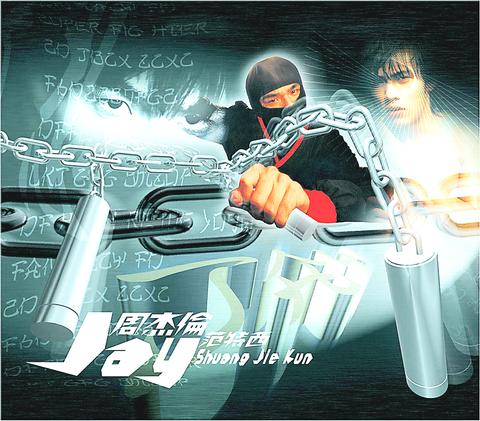As if it wasn't enough for Jay Chou (
He's been able to break through thanks to some clever marketing by his European distributor BMG, which transformed Jay into a nun-chuck-swinging kung-fu master. Propelling this son-of-Bruce Lee (
The hip-hop song mixes in an erhu with electric guitar and aggressive beats. It's not an entirely original format, but Shuang Jie Gun pulls it off without losing a trace of pop appeal. The song was a hit in Taiwan last year, which is to be expected since everything Jay releases is practically guaranteed to become a hit. But Alfa Music, Jay's label in Taiwan, won't dare to guess why Jay could become so big in Europe.

PHOTO COURTESY OF BMG
"The bosses at BMG in Europe saw the video and were like, `whoa, what's this? This is amazing.' So, I think it's the curiosity factor for them and for the audience," said Ethan Ko (
The image makeover suggests BMG opted for the retro kung-fu B-movie angle popularized by Wu Tang Clan's 36 Chambers album. In Taiwan, the cover of the Fantasy album containing Shuang Jie Gun is simply a picture of Jay's shadowed face looking pensive. The European cover, however, features someone in a ninja outfit twirling nun-chucks, which is more in line with the Jay that Europeans know from the Shuang Jie Gun video. The name of the album was also changed to the title of the hit single. What fans will make of the more syrupy ballads that make up most of the rest of the album is anyone's guess.
Shuang Jie Gun has been moving thousands of copies across Europe, but solid sales figures are still not available.
Jay came onto the Taiwan pop scene two years ago with an eponymous album that launched him almost overnight to superstar status. He was then able to follow up with Fantasy, which did just as well as his first album, selling 400,000 copies in Taiwan alone and about 700,000 in Asia.
Fantasy earned Jay the best album award at the Golden Melody Awards on May 4 and while he was at it, Jay also picked up the best producer and best songwriter awards. Shuang Jie Gun, meanwhile, picked up the award for best arrangement.

June 2 to June 8 Taiwan’s woodcutters believe that if they see even one speck of red in their cooked rice, no matter how small, an accident is going to happen. Peng Chin-tian (彭錦田) swears that this has proven to be true at every stop during his decades-long career in the logging industry. Along with mining, timber harvesting was once considered the most dangerous profession in Taiwan. Not only were mishaps common during all stages of processing, it was difficult to transport the injured to get medical treatment. Many died during the arduous journey. Peng recounts some of his accidents in

“Why does Taiwan identity decline?”a group of researchers lead by University of Nevada political scientist Austin Wang (王宏恩) asked in a recent paper. After all, it is not difficult to explain the rise in Taiwanese identity after the early 1990s. But no model predicted its decline during the 2016-2018 period, they say. After testing various alternative explanations, Wang et al argue that the fall-off in Taiwanese identity during that period is related to voter hedging based on the performance of the Democratic Progressive Party (DPP). Since the DPP is perceived as the guardian of Taiwan identity, when it performs well,

A short walk beneath the dense Amazon canopy, the forest abruptly opens up. Fallen logs are rotting, the trees grow sparser and the temperature rises in places sunlight hits the ground. This is what 24 years of severe drought looks like in the world’s largest rainforest. But this patch of degraded forest, about the size of a soccer field, is a scientific experiment. Launched in 2000 by Brazilian and British scientists, Esecaflor — short for “Forest Drought Study Project” in Portuguese — set out to simulate a future in which the changing climate could deplete the Amazon of rainfall. It is

Artifacts found at archeological sites in France and Spain along the Bay of Biscay shoreline show that humans have been crafting tools from whale bones since more than 20,000 years ago, illustrating anew the resourcefulness of prehistoric people. The tools, primarily hunting implements such as projectile points, were fashioned from the bones of at least five species of large whales, the researchers said. Bones from sperm whales were the most abundant, followed by fin whales, gray whales, right or bowhead whales — two species indistinguishable with the analytical method used in the study — and blue whales. With seafaring capabilities by humans